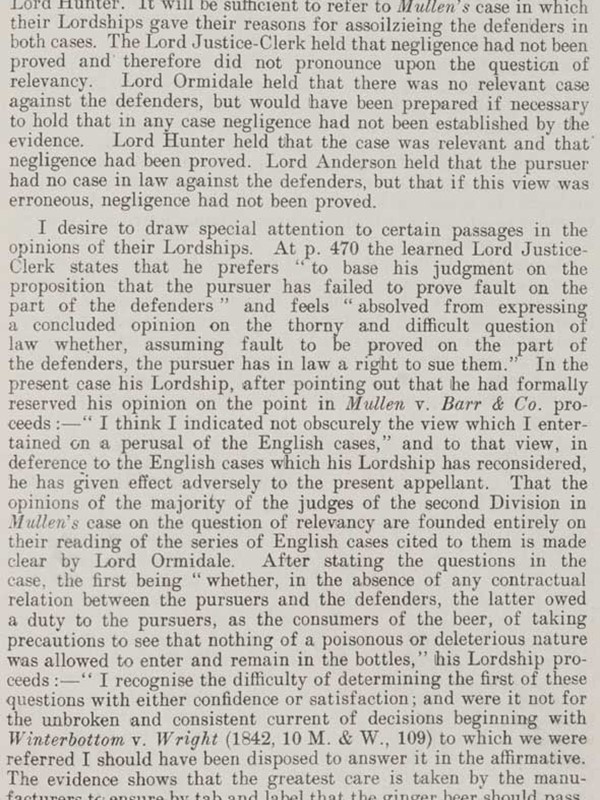Lord Macmillan Page 2
|
2 The two cases, being to all intents and purposes identical, were heard and decided together. In Mullen v. Barr & Co. the Sheriff-Substitute allowed a proof, but the Sheriff on appeal dismissed the action as irrelevant. In McGowan v. Barr & Co. the Sheriff-Substitute allowed a proof and the Sheriff altered his interlocutor by allowing a proof before answer, that is to say, a proof under reservation of all objections to the relevancy of the action. On the cases coming before the Second Division on the appeals of the pursuer and the defenders respectively their Lordships ordered a proof before answer in each case and the evidence was taken before Lord Hunter. It will be sufficient to refer to Mullen's case in which their Lordships gave their reasons for assoilzieing the defenders in both cases. The Lord Justice-Clerk held that negligence had not been proved and therefore did not pronounce upon the question of relevancy. Lord Ormidale held that there was no relevant case against the defenders, but would have been prepared if necessary to hold that in any case negligence had not been established by the evidence. Lord Hunter held that the case was relevant and that negligence had been proved. Lord Anderson held that the pursuer had no case in law against the defenders, but that if this view was erroneous, negligence had not been proved. I desire to draw special attention to certain passages in the opinions of their Lordships. At p. 470 the learned Lord Justice-Clerk states that he prefers "to base his judgment on the proposition that the pursuer has failed to prove fault on the part of the defenders" and feels "absolved from expressing a concluded opinion on the thorny and difficult question of law whether, assuming fault to be proved on the part of the defenders, the pursuer has in law a right to sue them." In the present case his Lordship, after pointing out that he had formally reserved his opinion on the point in Mullen v. Barr & Co. proceeds:— "I think I indicated not obscurely the view which I entertained on a perusal of the English cases," and to that view, in deference to the English cases which his Lordship has reconsidered, he has given effect adversely to the present appellant. That the opinions of the majority of the judges of the second Division in Mullen's case on the question of relevancy are founded entirely on their reading of the series of English cases cited to them is made clear by Lord Ormidale. After stating the questions in the case, the first being "whether, in the absence of any contractual relation between the pursuers and the defenders, the latter owed a duty to the pursuers, as the consumers of the beer, of taking precautions to see that nothing of a poisonous or deleterious nature was allowed to enter and remain in the bottles," his Lordship proceeds:— "I recognise the difficulty of determining the first of these questions with either confidence or satisfaction; and were it not for the unbroken and consistent current of decisions beginning with Winterbottom v. Wright (1842, 10 M. & W., 109) to which we were referred I should have been disposed to answer it in the affirmative. The evidence shows that the greatest care is taken by the manufacturers to ensure by tab and label that the ginger beer should pass, as it were, from the hand of the maker to the hand of the ultimate user uninterfered with by the retail dealer — who has little interest in, and no opportunity of, examining the contents of the containers. Accordingly it would appear to be reasonable and equitable to hold that, in the circumstances and apart altogether from contract, there exists a relationship of duty as between the maker and the consumer of the beer. Such considerations, however, as I read the authorities, have been held to be irrelevant in analogous circumstances." Lord Ormidale thus finds himself constrained to reach a conclusion which appears to him to be contrary to reason and equity by his reading of what he describes as an "unbroken and consistent current of decisions beginning with Winterbottom v. Wright." In view of the |
Lord Macmillan Page 2
